英语副词短语
- 格式:pptx
- 大小:141.22 KB
- 文档页数:19
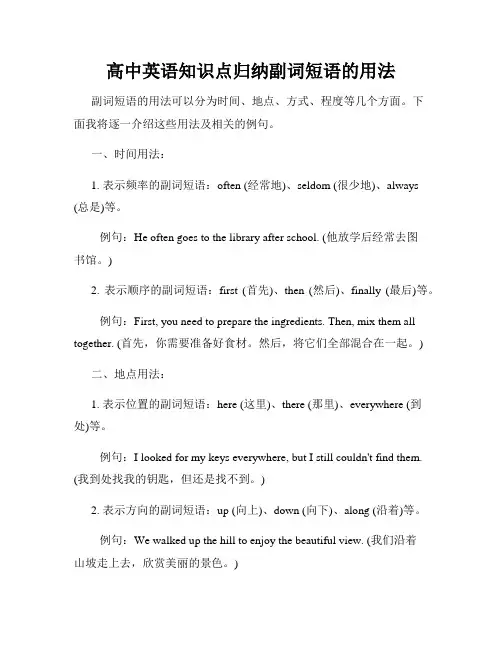
高中英语知识点归纳副词短语的用法副词短语的用法可以分为时间、地点、方式、程度等几个方面。
下面我将逐一介绍这些用法及相关的例句。
一、时间用法:1. 表示频率的副词短语:often (经常地)、seldom (很少地)、always (总是)等。
例句:He often goes to the library after school. (他放学后经常去图书馆。
)2. 表示顺序的副词短语:first (首先)、then (然后)、finally (最后)等。
例句:First, you need to prepare the ingredients. Then, mix them all together. (首先,你需要准备好食材。
然后,将它们全部混合在一起。
)二、地点用法:1. 表示位置的副词短语:here (这里)、there (那里)、everywhere (到处)等。
例句:I looked for my keys everywhere, but I still couldn't find them. (我到处找我的钥匙,但还是找不到。
)2. 表示方向的副词短语:up (向上)、down (向下)、along (沿着)等。
例句:We walked up the hill to enjoy the beautiful view. (我们沿着山坡走上去,欣赏美丽的景色。
)三、方式用法:1. 表示方式的副词短语:carefully (小心地)、quickly (快速地)、quietly (安静地)等。
例句:She spoke quietly so as not to wake the baby. (她小声说话,以免把孩子吵醒。
)2. 表示状态的副词短语:happily (快乐地)、sadly (悲伤地)、nervously (紧张地)等。
例句:The children jumped happily when they heard the good news. (孩子们在听到好消息时高兴地跳了起来。
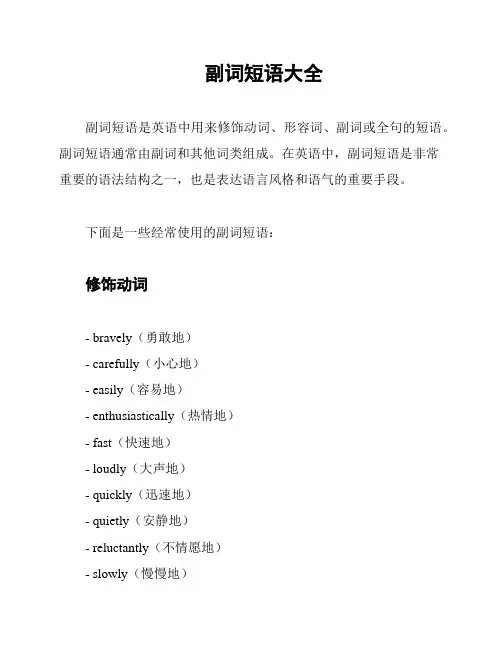
副词短语大全副词短语是英语中用来修饰动词、形容词、副词或全句的短语。
副词短语通常由副词和其他词类组成。
在英语中,副词短语是非常重要的语法结构之一,也是表达语言风格和语气的重要手段。
下面是一些经常使用的副词短语:修饰动词- bravely(勇敢地)- carefully(小心地)- easily(容易地)- enthusiastically(热情地)- fast(快速地)- loudly(大声地)- quickly(迅速地)- quietly(安静地)- reluctantly(不情愿地)- slowly(慢慢地)- softly(柔和地)- steadily(稳定地)- suddenly(突然地)- tirelessly(不知疲倦地)- uncertainly(不确定地)- urgently(紧急地)- willingly(乐意地)- wisely(明智地)- yearly(每年地)修饰形容词- amazingly(令人惊奇地)- angrily(生气地)- anxiously(焦急地)- beautifully(美丽地)- bitterly(苦涩地)- blindly(盲目地)- brightly(明亮地)- carelessly(粗心地)- cautiously(小心地)- cheerfully(快乐地)- clearly(清晰地)- closely(密切地)- coldly(冷酷地)- confidently(自信地)- correctly(正确地)- courageously(勇敢地)- crazily(疯狂地)- cruelly(残酷地)- deeply(深深地)- deliberately(故意地)- desperately(绝望地)- differently(不同地)- dimly(昏暗地)- dully(沉闷地)- easily(容易地)- elegantly(优美地)- enthusiastically(热情地)- entirely(完全地)- equally(相等地)- eventually(最终)- exactly(确切地)- excitedly(兴奋地)- extremely(极其)- fairly(公正地)- faithfully(忠实地)- famously(有名地)- far(远地)- fast(快速地)- fiercely(猛烈地)- foolishly(愚蠢地)- formally(正式地)- frankly(坦率地)- freely(自由地)- frantically(疯狂地)- fully(充分地)- furiously(狂怒地)- generally(通常地)- gently(温柔地)- gladly(乐意地)- gracefully(优雅地)- gratefully(感激地)- greatly(非常地)- hard(困难地)- hardly(几乎不)- harshly(苛刻地)- heavily(沉重地)- heroically(英雄般地)- highly(高度地)- honestly(诚实地)- hopelessly(无望地)- horribly(可怕地)- hurriedly(匆忙地)- immediately(立即)- impatiently(不耐烦地)- incredibly(难以置信地)- indifferently(冷淡地)- innocently(无辜地)- inquisitively(好奇地)- intensely(强烈地)- ironically(讽刺地)- joyfully(充满喜悦地)- justly(公正地)- kindly(友好地)- largely(大量地)- lazily(懒散地)- lightly(轻轻地)- likely(可能)- limply(柔软地)- lively(活泼地)- longingly(渴望地)- loosely(松散地)- lovingly(充满爱意地)- loudly(大声地)- madly(发疯地)- mainly(主要地)- meaningfully(有意义地)- mechanically(机械地)- merely(只是)- miserably(痛苦地)- mysteriously(神秘地)- nearly(近乎)- neatly(整洁地)- nervously(紧张地)- normally(正常地)- obediently(顺从地)- obviously(显然)- occasionally(偶尔)- oddly(古怪地)- officially(官方地)- openly(公开地)- painfully(痛苦地)- partially(部分地)- particularly(特别地)- patiently(耐心地)- perfectly(完美地)- physically(身体上地)- playfully(玩味地)- politely(礼貌地)- poorly(不好地)- powerfully(强大地)- promptly(迅速地)- properly(适当地)- proudly(自豪地)- quickly(迅速地)- quietly(安静地)- rapidly(迅速地)- rarely(罕见地)- really(真的)- reasonably(合理地)- recently(最近)- recklessly(鲁莽地)- regularly(定期地)- reluctantly(不情愿地)- repeatedly(多次地)- respectfully(尊敬地)- richly(丰富地)- rightfully(合法地)- roughly(大体地)- sadly(悲伤地)- safely(安全地)- scarcely(几乎没有)- selfishly(自私地)- seriously(认真地)- severely(严重地)- shakily(摇晃地)- sharply(尖锐地)- shyly(害羞地)- silently(沉默地)- simply(简单地)- sincerely(真诚地)- smoothly(顺利地)- softly(柔和地)- solemnly(庄严地)- solidly(坚固地)- sometimes(有时)- somewhat(有点)- soon(不久)- sorely(痛苦地)- specifically(具体)- speedily(飞快地)- spiritualy(精神上地)- spitefully(恶意地)- spontaneously(自发地)- stealthily(秘密地)- sternly(严厉地)- still(静止不动地)- strictly(严格地)- strongly(强烈地)- suddenly(突然地)- suitably(适当地)- surely(肯定)- suspiciously(可疑地)- sweetly(甜美地)- swiftly(迅速地)- sympathetically(同情地)- tenderly(温柔地)- tensely(紧张地)- terribly(可怕地)- thankfully(感激地)- thoroughly(彻底地)- thoughtfully(仔细地)- tightly(紧紧地)- too(太)- totally(完全地)- touchingly(感人地)- traditionally(传统地)- truly(真正地)- truthfully(诚恳地)- ultimately(最终)- unexpectedly(意外地)- unfortunately(不幸地)- usually(通常地)- utterly(彻底地)- vaguely(含糊地)- valiantly(勇敢地)- very(非常地)- viciously(恶意地)- victoriously(胜利地)- violently(猛烈地)- vivaciously(活泼地)- voluntarily(自愿地)- warmly(热情地)- weakly(虚弱地)- wearily(疲劳地)- well(好)- wildly(狂野地)- willingly(乐意地)- wisely(明智地)- woefully(悲哀地)- wonderfully(美妙地)- wrongly(错误地)- yearly(每年地)- yesterday(昨天)- zealously(热心地)以上是一些常用的副词短语,以供参考。

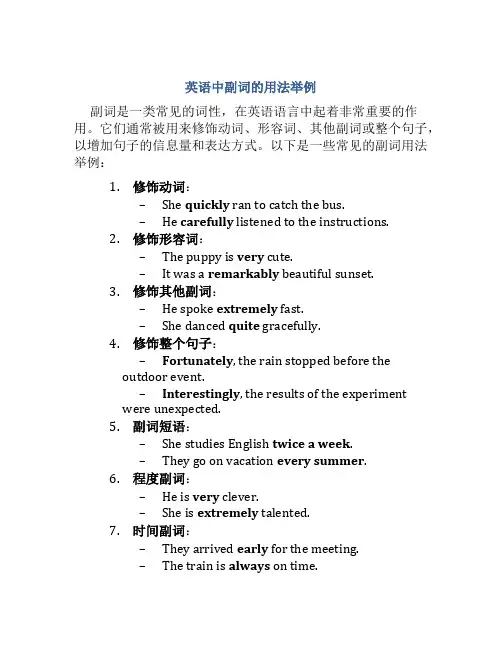
英语中副词的用法举例副词是一类常见的词性,在英语语言中起着非常重要的作用。
它们通常被用来修饰动词、形容词、其他副词或整个句子,以增加句子的信息量和表达方式。
以下是一些常见的副词用法举例:1.修饰动词:–She quickly ran to catch the bus.–He carefully listened to the instructions.2.修饰形容词:–The puppy is very cute.–It was a remarkably beautiful sunset.3.修饰其他副词:–He spoke extremely fast.–She danced quite gracefully.4.修饰整个句子:–Fortunately, the rain stopped before theoutdoor event.–Interestingly, the results of the experiment were unexpected.5.副词短语:–She studies English twice a week.–They go on vacation every summer.6.程度副词:–He is very clever.–She is extremely talented.7.时间副词:–They arrived early for the meeting.–The train is always on time.8.地点副词:–She looked everywhere for her lost keys.–The children ran upstairs to get their toys.9.方式副词:–He speaks English fluently.–She completed the task successfully.副词在英语中有多种用法,通过灵活运用副词可以使语言更加生动、精确和有表现力。
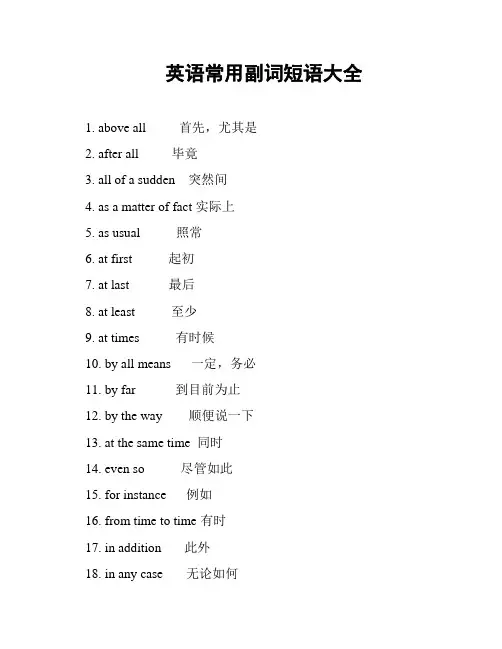
英语常用副词短语大全1. above all 首先,尤其是2. after all 毕竟3. all of a sudden 突然间4. as a matter of fact 实际上5. as usual 照常6. at first 起初7. at last 最后8. at least 至少9. at times 有时候10. by all means 一定,务必11. by far 到目前为止12. by the way 顺便说一下13. at the same time 同时14. even so 尽管如此15. for instance 例如16. from time to time 有时17. in addition 此外18. in any case 无论如何19. in brief 简言之20. in conclusion 总之21. in fact 事实上22. in other words 换句话说23. in particular 特别地24. in short 简而言之25. in the end 最终26. in the meantime 同时27. indeed 的确28. instead 代替29. just as 正如30. likewise 同样地31. meanwhile 同时32. moreover 此外33. nevertheless 尽管如此34. nonetheless 仍然35. of course 当然36. on the contrary 相反37. on the whole 总的来说38. otherwise 否则39. overall 总体而言40. particularly 特别是41. similarly 类似地42. that is 即43. therefore 因此44. thus 因此45. undoubtedly 无疑46. yet 然而。
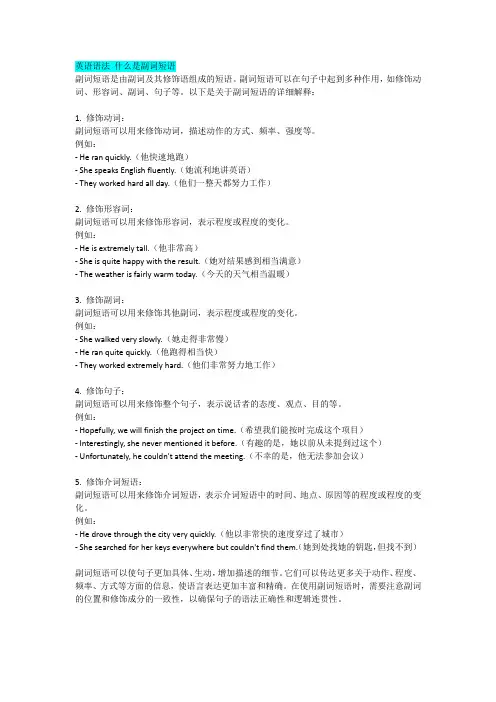
英语语法什么是副词短语副词短语是由副词及其修饰语组成的短语。
副词短语可以在句子中起到多种作用,如修饰动词、形容词、副词、句子等。
以下是关于副词短语的详细解释:1. 修饰动词:副词短语可以用来修饰动词,描述动作的方式、频率、强度等。
例如:- He ran quickly.(他快速地跑)- She speaks English fluently.(她流利地讲英语)- They worked hard all day.(他们一整天都努力工作)2. 修饰形容词:副词短语可以用来修饰形容词,表示程度或程度的变化。
例如:- He is extremely tall.(他非常高)- She is quite happy with the result.(她对结果感到相当满意)- The weather is fairly warm today.(今天的天气相当温暖)3. 修饰副词:副词短语可以用来修饰其他副词,表示程度或程度的变化。
例如:- She walked very slowly.(她走得非常慢)- He ran quite quickly.(他跑得相当快)- They worked extremely hard.(他们非常努力地工作)4. 修饰句子:副词短语可以用来修饰整个句子,表示说话者的态度、观点、目的等。
例如:- Hopefully, we will finish the project on time.(希望我们能按时完成这个项目)- Interestingly, she never mentioned it before.(有趣的是,她以前从未提到过这个)- Unfortunately, he couldn't attend the meeting.(不幸的是,他无法参加会议)5. 修饰介词短语:副词短语可以用来修饰介词短语,表示介词短语中的时间、地点、原因等的程度或程度的变化。
例如:- He drove through the city very quickly.(他以非常快的速度穿过了城市)- She searched for her keys everywhere but couldn't find them.(她到处找她的钥匙,但找不到)副词短语可以使句子更加具体、生动,增加描述的细节。
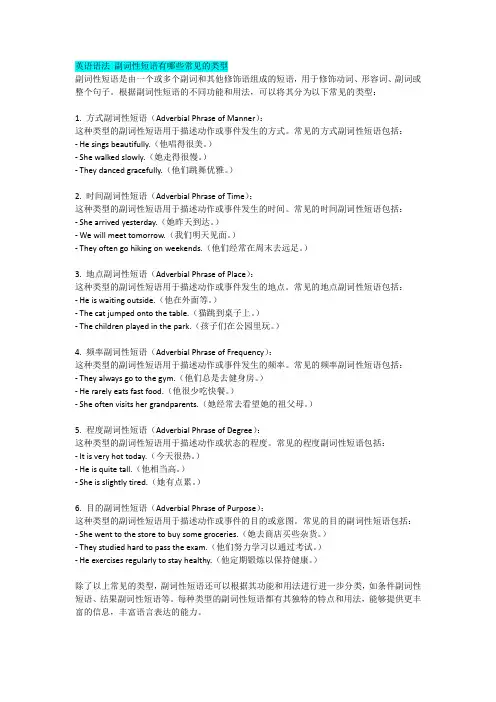
英语语法副词性短语有哪些常见的类型副词性短语是由一个或多个副词和其他修饰语组成的短语,用于修饰动词、形容词、副词或整个句子。
根据副词性短语的不同功能和用法,可以将其分为以下常见的类型:1. 方式副词性短语(Adverbial Phrase of Manner):这种类型的副词性短语用于描述动作或事件发生的方式。
常见的方式副词性短语包括:- He sings beautifully.(他唱得很美。
)- She walked slowly.(她走得很慢。
)- They danced gracefully.(他们跳舞优雅。
)2. 时间副词性短语(Adverbial Phrase of Time):这种类型的副词性短语用于描述动作或事件发生的时间。
常见的时间副词性短语包括:- She arrived yesterday.(她昨天到达。
)- We will meet tomorrow.(我们明天见面。
)- They often go hiking on weekends.(他们经常在周末去远足。
)3. 地点副词性短语(Adverbial Phrase of Place):这种类型的副词性短语用于描述动作或事件发生的地点。
常见的地点副词性短语包括:- He is waiting outside.(他在外面等。
)- The cat jumped onto the table.(猫跳到桌子上。
)- The children played in the park.(孩子们在公园里玩。
)4. 频率副词性短语(Adverbial Phrase of Frequency):这种类型的副词性短语用于描述动作或事件发生的频率。
常见的频率副词性短语包括:- They always go to the gym.(他们总是去健身房。
)- He rarely eats fast food.(他很少吃快餐。
)- She often visits her grandparents.(她经常去看望她的祖父母。

英语副词短语举例英语中,副词短语是一种由副词或副词词组构成的短语结构,用来修饰动词、形容词、副词或整个句子。
副词短语在句子中起到提供更多细节和描述的作用,丰富了句子的意义。
本文将介绍一些常见的英语副词短语,并通过举例说明它们的用法和功能。
1. 形容词副词短语形容词副词短语用来修饰形容词,增强形容词的程度或范围。
以下是一些常见的形容词副词短语:- Very slowly(非常慢地):这个副词短语用来修饰动词,表示动作的缓慢程度。
例如:She walked very slowly across the room(她非常慢地走过房间)。
- Quite often(相当经常):这个副词短语用来修饰副词,表示副词所描述的动作或状态的频率。
例如:He goes to the gym quite often(他相当经常去健身房)。
- Too loud(太大声):这个副词短语用来修饰形容词,表示形容词所描述的特征过于突出或超出了合理范围。
例如:The music was too loud(音乐太大声了)。
2. 时间副词短语时间副词短语用来表示动作发生的时间,或者描述动作的持续时间。
以下是一些常见的时间副词短语:- In the morning(在早晨):这个副词短语表示动作发生的具体时间点。
例如:I usually have breakfast in the morning(我通常在早晨吃早餐)。
- For a while(一段时间):这个副词短语用来描述动作或状态的持续时间。
例如:She sat on the bench for a while(她在长椅上坐了一会儿)。
- After school(放学后):这个副词短语表示动作发生的相对时间。
例如:We always play soccer after school(我们放学后总是玩足球)。
3. 地点副词短语地点副词短语用来描述动作的地点或者行为的方向。
以下是一些常见的地点副词短语:- In the garden(在花园里):这个副词短语表示动作发生的具体地点。
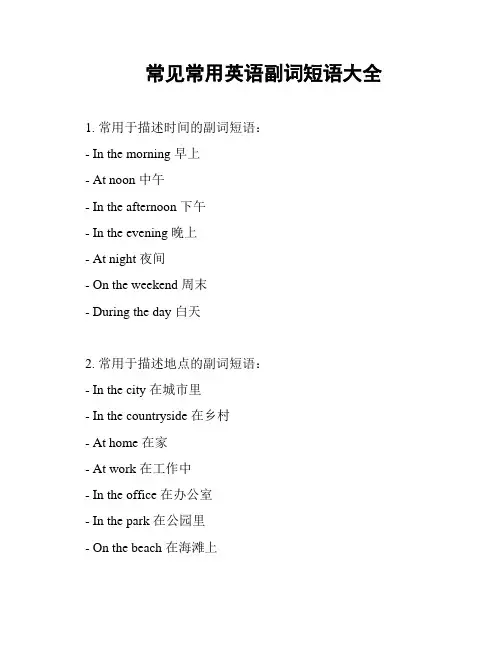
常见常用英语副词短语大全1. 常用于描述时间的副词短语:- In the morning 早上- At noon 中午- In the afternoon 下午- In the evening 晚上- At night 夜间- On the weekend 周末- During the day 白天2. 常用于描述地点的副词短语:- In the city 在城市里- In the countryside 在乡村- At home 在家- At work 在工作中- In the office 在办公室- In the park 在公园里- On the beach 在海滩上3. 常用于描述频率的副词短语:- Often 经常- Sometimes 有时候- Always 总是- Rarely 很少- Occasionally 偶尔- Never 从不- Seldom 很少4. 常用于描述程度的副词短语:- Very 非常- Quite 相当- Extremely 极其- Absolutely 绝对地- Fairly 相当- Rather 有点儿5. 常用于描述方式的副词短语:- Carefully 小心地- Quickly 快速地- Slowly 慢慢地- Loudly 大声地- Quietly 安静地- Politely 有礼貌地- Cautiously 谨慎地6. 常用于描述结果的副词短语:- Therefore 因此- Consequently 因此- Accordingly 相应地- Thus 如此- So 因此- Hence 因此- As a result 结果7. 常用于描述顺序的副词短语:- First 首先- Secondly 第二- Finally 最后- Next 接下来- Then 然后- Lastly 最后- Previously 以前注意:文中的英语副词短语仅供参考,可以根据具体情况进行使用和变动。
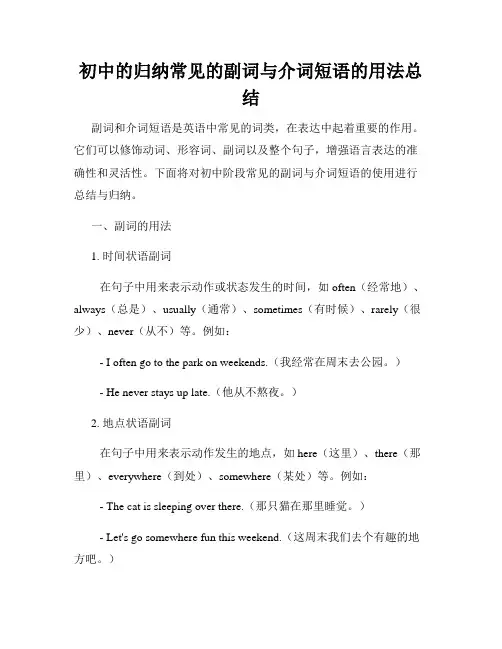
初中的归纳常见的副词与介词短语的用法总结副词和介词短语是英语中常见的词类,在表达中起着重要的作用。
它们可以修饰动词、形容词、副词以及整个句子,增强语言表达的准确性和灵活性。
下面将对初中阶段常见的副词与介词短语的使用进行总结与归纳。
一、副词的用法1. 时间状语副词在句子中用来表示动作或状态发生的时间,如often(经常地)、always(总是)、usually(通常)、sometimes(有时候)、rarely(很少)、never(从不)等。
例如:- I often go to the park on weekends.(我经常在周末去公园。
)- He never stays up late.(他从不熬夜。
)2. 地点状语副词在句子中用来表示动作发生的地点,如here(这里)、there(那里)、everywhere(到处)、somewhere(某处)等。
例如: - The cat is sleeping over there.(那只猫在那里睡觉。
)- Let's go somewhere fun this weekend.(这周末我们去个有趣的地方吧。
)3. 方式状语副词在句子中用来表示动作进行的方式,如fast(快速地)、slowly (慢慢地)、carefully(小心地)、loudly(大声地)等。
例如: - She sings beautifully.(她唱得很美。
)- The baby is sleeping soundly.(宝宝睡得很香。
)4. 程度副词表示动作、形容词和副词的程度,如very(非常)、too(太)、so(如此)、quite(相当)等。
例如:- The movie was very exciting.(这部电影非常刺激。
)- He speaks English fluently.(他讲英语非常流利。
)二、介词短语的用法1. 时间介词短语表示动作发生的时间,如in the morning(在早上)、on Monday (在星期一)、at night(在晚上)等。
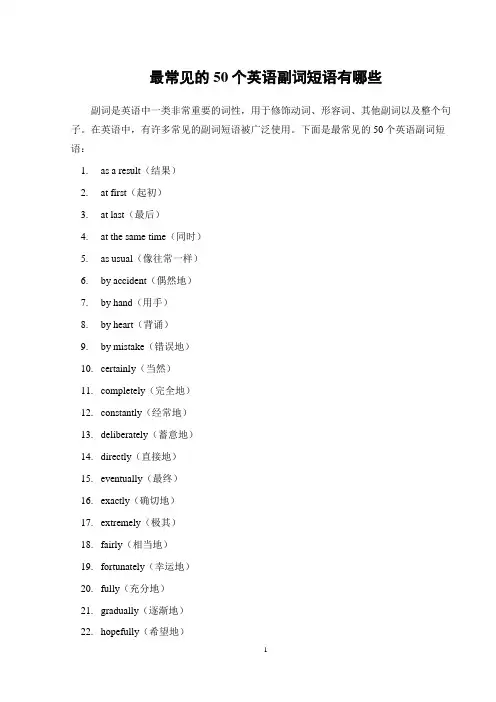
最常见的50个英语副词短语有哪些副词是英语中一类非常重要的词性,用于修饰动词、形容词、其他副词以及整个句子。
在英语中,有许多常见的副词短语被广泛使用。
下面是最常见的50个英语副词短语:1.as a result(结果)2.at first(起初)3.at last(最后)4.at the same time(同时)5.as usual(像往常一样)6.by accident(偶然地)7.by hand(用手)8.by heart(背诵)9.by mistake(错误地)10.certainly(当然)pletely(完全地)12.constantly(经常地)13.deliberately(蓄意地)14.directly(直接地)15.eventually(最终)16.exactly(确切地)17.extremely(极其)18.fairly(相当地)19.fortunately(幸运地)20.fully(充分地)21.gradually(逐渐地)22.hopefully(希望地)23.immediately(立即)24.infinitely(无限地)25.instead(代替)tely(最近)27.likely(很可能)28.nearly(接近)29.often(经常)30.occasionally(偶尔)31.particularly(特别)32.perfectly(完美地)33.quite(相当)34.rarely(很少)35.really(真的)36.recently(最近)37.sadly(悲伤地)38.secretly(秘密地)39.seriously(严肃地)40.similarly(类似地)41.slightly(稍微)42.suddenly(突然)43.surely(肯定)44.too(也)ually(通常)46.very(非常)47.well(好地)48.widely(广泛地)49.willingly(愿意地)50.wrongly(错误地)以上是最常见的50个英语副词短语,它们在日常生活和写作中都有重要的作用。
高中英语语法专题副词与必背短语高中英语语法专题副词一、概念副词(Adverb 简称adv.)是指在句子中表示行为或状态特征的词,用以修饰动词、形容词、副词本身的词。
①副词修饰动词 He runs fast. 他跑得很快。
②副词修饰形容词 He is very clever. 他很聪明。
③副词修饰副词 I can dance very well. 我跳舞跳得不错。
二、副词分类时间副词(today,ago)、地点副词(here,upstairs)、程度副词(very,so)、方式副词(fast,loudly) 、疑问副词(when,how)、关系副词(when,where等常用来引导定语从句)、频率副词(often,never). 需要注意副词在句子中的位置,表示地点、时间、方式的副词通常放在句末,而频率副词和程度副词通常放在助动词后,实义动词前,即“助后动前”。
三、形容变副词1. 形容词词尾加ly 例如:loud-loudly slow-slowly2. 形容词以辅音字母加y结尾,去掉y变i加ly 例如:heavy-heavily happy-happily3. 部分形容词以e结尾,去掉e再加ly 例如:whole-wholly true-truly4. 特殊变化例如:good-well5. 形容词副词同形例如:late-late hard-hard fast-fast四、副词在句子中的成分1. 副词作状语例如:She studies hard.她学习很用功(hard作方式状语修饰动词study)2. 副词作定语例如:He likes the pictures there. 他喜欢那儿的图画.(there修饰pictures作定语)3. 副词作表语例如:I’m home.我到家了。
(home作为地点副词,在这里是主系表结构中的表语)4. 副词作宾语补足语例如:I saw the light on last night.昨天晚上我看见灯亮着。
英语语法什么是副词副词(Adverbs)是一类用来修饰动词、形容词、副词或整个句子的词性。
它们提供了更多的细节和信息,以描述动作、状态、方式、时间、地点、频率、程度等。
副词在句子中起到修饰、限定或描述的作用,帮助我们更准确地表达意思。
在接下来的内容中,我将详细介绍副词的不同类型、用法和常见的副词短语。
一、副词的不同类型:1. 方式副词(Adverbs of Manner):用来描述动作或状态发生的方式、方法或风格。
例如:quickly(快速地)、carefully(小心地)、loudly(大声地)。
2. 时间副词(Adverbs of Time):用来描述动作或状态发生的时间。
例如:now(现在)、yesterday (昨天)、soon(很快)、always(总是)。
3. 地点副词(Adverbs of Place):用来描述动作或状态发生的地点或位置。
例如:here(这里)、there(那里)、everywhere(到处)。
4. 频率副词(Adverbs of Frequency):用来描述动作或状态发生的频率。
例如:often(经常)、never(从不)、rarely(很少)、always(总是)。
5. 程度副词(Adverbs of Degree):用来描述动作或状态的程度或强度。
例如:very(非常)、extremely(极其)、quite(相当)、rather(相当)。
6. 疑问副词(Interrogative Adverbs):用来提问句子中的时间、地点、原因、方式等。
例如:when(何时)、where(何地)、how(如何)。
7. 关系副词(Relative Adverbs):用来引导定语从句,并在从句中充当副词。
例如:where (在哪里)、when(在何时)、why(为什么)。
二、副词的用法:1. 修饰动词:副词可以用来修饰动词,描述动作发生的方式、时间、频率、程度等。
例如:- He runs slowly.(他跑得慢。
副词时间副词种类1.确切时间:yesterday, today, now, tomorrow2.不确切时间:already, recently, lately, before, soon, then, afterwards3.副词短语:this morning, last night, in the morning, a week ago, three months ago, at once, in a while, in recent days.位置确切时间副词:句首 or 句末(更常见)(祈使句只在句末)Tomorrow I’m leaving for Beijing on a businiess tour.I’m leaving for Beiji ng on a business tour a week ago.Come to my office this afternoon.不确切时间副词:句首 or 句中 or 句末Very soon we’ll be thereWe’ll very soon be thereI have been busy recently.*before, early, immediately, late 句末Ihave never heard such a story before.He came to school late.总结:句末保险,句中的副词不多,祈使句只在句末。
地点副词种类1.表示方向:away, down, in, off, on, over, out, round, up2.表示位置:here, there, somewhere, anywhere, nowhere, everywhere介词短语:in the park, at home, in the street位置(一般:动词后)1.方向副词在地点副词之前:He often walks around in the garden after supper.2.大地点副词在后:He works in a foreign-funded company in Beijing.3.方向副词away, down, in, off, on, over, out, round, up, here, there可以倒装倒装1:副词+动态动词+名词主语Here comes the teacher.Round and round flew the plane.倒装2:副词+物主代词+动态动词Away they went.Here he comes.4.介词短语+动词+主语倒装:down, from, in, on, over, out ,of, round, upFrom the trees hang a lot of monkeys.Down this street stand a lot of shops.On the ground lies a man whose legs are broken.总结:一般句末;有些倒装结构句首。
初中英语知识点归纳常见的副词短语用法总结一、频度副词短语(Adverbial Phrases of Frequency)1. Always(总是)例句:He always arrives early for the meeting.2. Usually(通常)例句:I usually go for a walk in the evening.3. Often(经常)例句:She often visits her grandparents on weekends.4. Sometimes(有时)例句:I sometimes forget my umbrella when it's raining.5. Occasionally(偶尔)例句:They occasionally go out for dinner on special occasions.6. Rarely(很少)例句:He rarely watches TV because he is always busy with his studies.7. Hardly ever(几乎从不)例句:She hardly ever goes to the gym, she prefers outdoor activities.8. Never(从不)例句:They never miss a chance to travel during summer vacation.二、时间副词短语(Adverbial Phrases of Time)1. In the morning/afternoon/evening(在早晨/下午/晚上)例句:I exercise in the morning before going to work.2. On weekdays/weekends(在工作日/周末)例句:I have to work on weekdays but I relax on weekends.3. At night(在晚上)例句:They like to stargaze at night in their backyard.4. By the end of(到...结束)例句:She will finish her project by the end of next week.5. In the meantime(与此同时)例句:While waiting for the bus, he read a book in the meantime.6. At the same time(同时)例句:They arrived at the party at the same time.7. From time to time(时常)例句:He visits his grandparents from time to time.8. All day/night long(整天/整晚)例句:They were dancing all night long at the party.三、地点副词短语(Adverbial Phrases of Place)1. In the park(在公园)例句:They often have picnics in the park on weekends.2. At school(在学校)例句:I met my friends at school during lunch break.3. On the beach(在海滩)例句:They love swimming and sunbathing on the beach.4. In the city/countryside(在城市/农村)例句:She enjoys the tranquility of living in the countryside.5. At home(在家)例句:He spends most of his weekends at home with his family. 6. On the way(在路上)例句:They had a great conversation on the way to the airport. 7. Across the road(在马路对面)例句:The supermarket is just across the road, it's very convenient.四、方式副词短语(Adverbial Phrases of Manner)1. In a hurry(匆忙地)例句:She left the house in a hurry because she was late for work.2. With pleasure(乐意地)例句:I will help you move next week, with pleasure.3. In a loud voice(大声地)例句:He shouted in a loud voice to get the attention of the audience.4. On purpose(故意地)例句:He spilled the drink on purpose to annoy his sister.5. By accident(偶然地)例句:I found this lost wallet by accident while walking in the park.6. In a funny way(滑稽地)例句:He imitates his teacher in a funny way and makes everyone laugh.7. In a serious manner(严肃地)例句:The teacher spoke to the students in a serious manner about their behavior.总结:副词短语在英语中起到修饰动词、形容词、副词和整个句子的作用,能够更准确地表达出时间、地点、方式和频率等信息。
英语常见副词用法详解下面是小编整理的一些英语常见副词用法详解,以供大家学习参考。
英语常见副词用法详解由于副词短语和副词的作用差不多,为了方便,我们把两者放在一起讨论,统称为“副词(短语)”,说明时间的称为“时间副词(短语)”。
一.时间副词(短语)1、副词(短语)表示的时间与动词时态的关系1) 表示过去时间的副词(短语),可和过去时的谓语动词一起用,也可和“助动词+现在完成时”构成的谓语一起用:He“came”yesterday.John“was”born in 1940.He“was” formerly( or once) a rich man.He “arrived”two days ago.He “got” married last week.He “left” Paris two weeks back.He“can't have arrived” here today week(or a week ago).He “may have left”(on) Thursday week(or Thursday of last week).The diamond “must have been stolen” on Friday before last.2) 表示现在时间的副词(短语)可以和各种时态一起用:He“is”tired now.He“is studying” music today.We“are learning” music this year.I “have done”my exercise this week.He“will do” many things today.(今天早晨讲的话)He“did” many things this year.(今年较晚时讲的话)He“has done” many things this week.(周末讲的话)3) 有些副词(短语),可和现在完成时或一般过去时的动词一起用:I“saw”(or“have seen”) him lately(or of late,recently,before,before now,all along,right along, in the past,over the years).He has just gone out.(英式)He just went out.(美式)4) 有些副词(短语),多和完成时态的动词一起用,偶尔和其他时态的动词一起用:He“has been” ill since 2 June(or ever since,since two months ago).Till now(or Up to now,Until this time)nothing“has happened”.So far(or As yet,Thus far) he“had said” nothing to me.So far he “was trying” without success.There “is” as yet no hope for peace.The guests “(had) arrived” by([=before or at] seven o'clock).5) 表示未来时间的副词(短语),必须和将来时或现在(一般或进行)时的动词一起用:He“will come” tomorrow.I“shall meet” him some day(or one day).He“will begin” his work next week.He“will call” on me in ten days(or in ten days time,ten days from now).He“will do” it soon(or shortly,presently,instantly,before long,by and by).(这6个副词及副词短语也可以和过去将来时的动词一起用:He“would do”it soon.He “would come” shortly.)He“arrives”this coming Thursday.He“is to move”(on)Friday(of)next week.He“is leaving” today week(or a week from today).He“is returning” this day month(or a month from this day).6) 个别副词(短语)可以和过去时或将来时的动词一起用:She came last Monday and he “came” the day before(or two days later).She will come next Monday,and he “will come” the day be- fore(or two days later).7) 频度副词(短语)可以和任何时态的动词一起用:He“studied”(or“had studied”,“was studying”,“studies”,“is studying”,“has studied”,“will study”)every day.He“is”always(or often,frequently,sometimes,occasion- ally,seldom,rarely,scarcely,hardly,never)ill.I“have warned” him once again(or a time or two,once in a long while,now and then,now and again,again and again,time and again,over and over again ).He will be permanently(or forever)blind.The periodical“is” published daily(or weekly,monthly,quarterly,yearly).8) 表示时间长度的副词(短语)可以和任何时态的动词一起用:He“stayed”in France(for)three years.They“gambled” all the year(round).They “gambled” all the night (thro ugh).He“started”work from 1950.He“served”his country till his death.He“will work” for me during my absence.He “can cross” the river in thirty minutes(or in a short time).We“are working” all(the) day long.The fish “will not live”over the night(or over this week).He“has done” much over the year.I “have done”nothing during the vacation.2、某些时间副词(短语)的特殊用法1) 有些时间副词(短语)的特殊用法值得注意:I shall go tomorrow(=the day after today).但:He went last Sunday,(or on the following day)(不能说I went on tomorrow).但:He went last Sunday,and I went on the previous day (or the day before)(不能说yesterday).He will go next Sunday,and I will go on the previous day(or the day be- fore)(不能说yesterday).2)I saw him three days ago(=on the third day before to- day).但:I arrived last Sunday and I informed him of my arrival three days before(=on the third day before last Sunday)(不能说three days ago).3)I shall see him in three days(=on the third day after to- day)(不要说after three days).但:I arrived last Sunday and I saw him three days later (or three days afterwards,after three days,in three days).I shall arrive on 6 July and will see him three days later(or three days afterwards,after three days,in three days).。
《副词短语》知识清单一、什么是副词短语副词短语是由一个副词和一个或多个相关的词(通常是介词短语、名词短语或形容词短语)组成的短语,在句子中一起充当副词的作用,用来修饰动词、形容词、副词或整个句子。
例如:“in a hurry(匆忙地)”、“very carefully(非常仔细地)”、“quite often(经常)”等。
二、副词短语的构成1、副词+介词短语常见的有:“up to now(直到现在)”、“in advance(提前)”、“by accident(偶然)”等。
2、副词+名词短语例如:“right now(立刻)”、“just then(就在那时)”等。
3、副词+形容词短语像“so beautiful(如此美丽)”、“too difficult(太难)”等。
三、副词短语的分类1、时间副词短语这类短语表示动作发生的时间,比如:“at present(目前)”、“from time to time(不时)”、“day after day(日复一日)”。
2、地点副词短语用于指示动作发生的地点或位置,如:“here and there(到处)”、“far away(遥远)”、“nearby(在附近)”。
3、方式副词短语描述动作的方式或方法,比如:“in this way(用这种方式)”、“by hand(用手)”、“with care(小心地)”。
4、程度副词短语表明程度的强弱,像“very much(非常)”、“a little(一点)”、“quite a lot(相当多)”。
5、频率副词短语表示动作发生的频率,例如:“seldom(很少)”、“once a week(一周一次)”、“always(总是)”。
四、副词短语在句子中的作用1、修饰动词例如:“He runs very fast(他跑得非常快。
)”中的“very fast”修饰动词“runs”。
2、修饰形容词“She is extremely beautiful(她极其美丽。